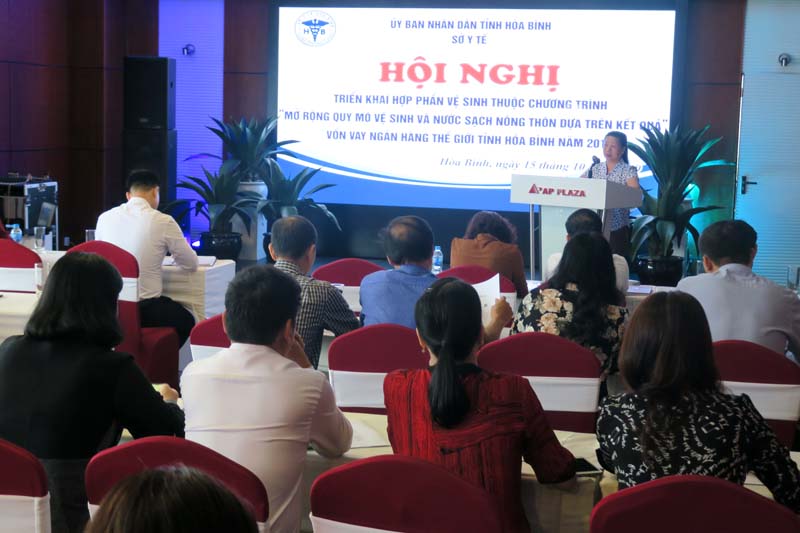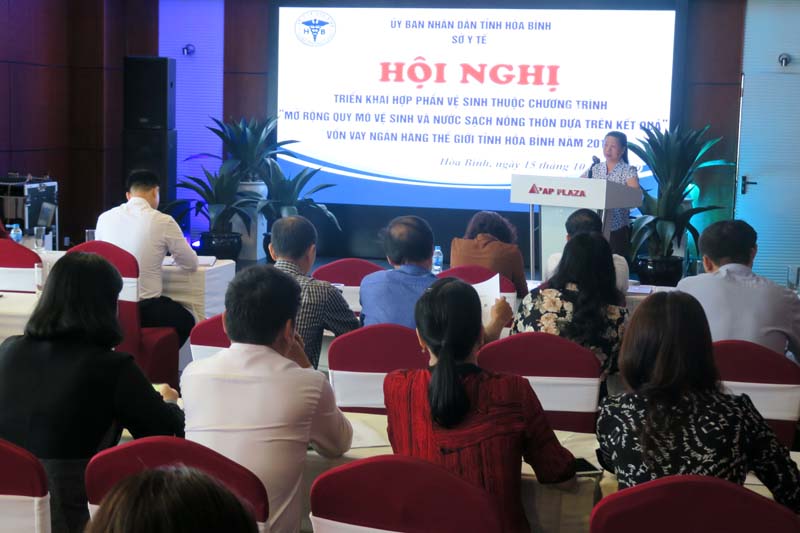
(HBO) - The Hoa Binh provincial Health Department in collaboration with relevant departments and agencies held a seminar to launch the Result-based Scaling Up Rural Sanitation and Water Supply Programme 2019 that uses the World Bank’s loan. Attending the event were 45 delegates from departments, agencies, mass organisations, the provincial People’s Committee, the women’s unions, and the education and training offices of Lac Son and Kim Boi districts.
 Representative from
the provincial Health Department speaks at the event.
Representative from
the provincial Health Department speaks at the event.
Hoa Binh is one of the 21 provinces benefiting from the
programme, which aims to change rural dwellers’ awareness, behavior and
attitude, thus improving personal hygiene and enhancing sustainable public
access to clean water and rural sanitation.
On August 24, 2017, the provincial People’s Committee issued
Plan No.119 on the implementation of the programme for the 2016 – 2020 period. In
2018, the programme was carried out in communal medical stations, schools and
households in Ky Son, Cao Phong and Kim Boi districts. This year, the programme
was conducted in Kim Boi and Lac Son districts with 14 communes.
At the event, delegates was introduced to the programme and listened
to the need to invest in sanitation, approaches to methods to promote hygiene, favourable
conditions to foster rural sanitation, action plans at the communal, district
and provincial levels to carry out the programme.
The programme looks to build or renovate 400 toilets in 21
provinces. It is estimated that 5.3 million people will benefit from sanitation
in communes, 255,000 households benefit from improved water supply, 2,650
schools and medical stations enjoy improved water supply and sanitation, 3,000
officers and people at all levels benefit from capacity improvement. It expects
to mitigate environment pollution, improve living conditions and public health,
and create favourable conditions to fulfill environment targets in new-style rural
area building effort./.
The emulation movement "Hoa Binh joining hands to build new-style rural areas” has been widely spreading, becoming a driving force that motivates the localities to renew rural landscapes and improve the material and spiritual lives of the residents. In this movement, the people play a central role-both as the main implementers and direct beneficiaries of its outcomes.
In response to the global digital revolution, Hoa Binh Newspaper is transforming itself into a modern and multi-platform media hub, blending cutting-edge technology with a restructured newsroom and a new generation of tech-savvy journalists.
Hoa Binh province’s Association of the Elderly recently held a conference to review the project on expanding the inter-generation self-help club model until 2025.
In a move to implement Resolution No. 57-NQ/TW, issued on December 22, 2024 by the Politburo, which targets breakthroughs in science-technology development, innovation, and digital transformation, the Hoa Binh provincial Department of Health has issued a plan to roll out the "Digital Literacy for All” campaign within the local health sector.
An Nghia Commune (Lạc Sơn District) is one of the communes that achieved the tha standard of the national new rural area in 2018. Entering a new development phase, the commune is now trying to meet the criteria for the advanced new rural development. With the strong political will and the public consensus, the commune is gradually overcoming the challenges to reach this goal, aiming for the sustainable development.



 Representative from
the provincial Health Department speaks at the event.
Representative from
the provincial Health Department speaks at the event.